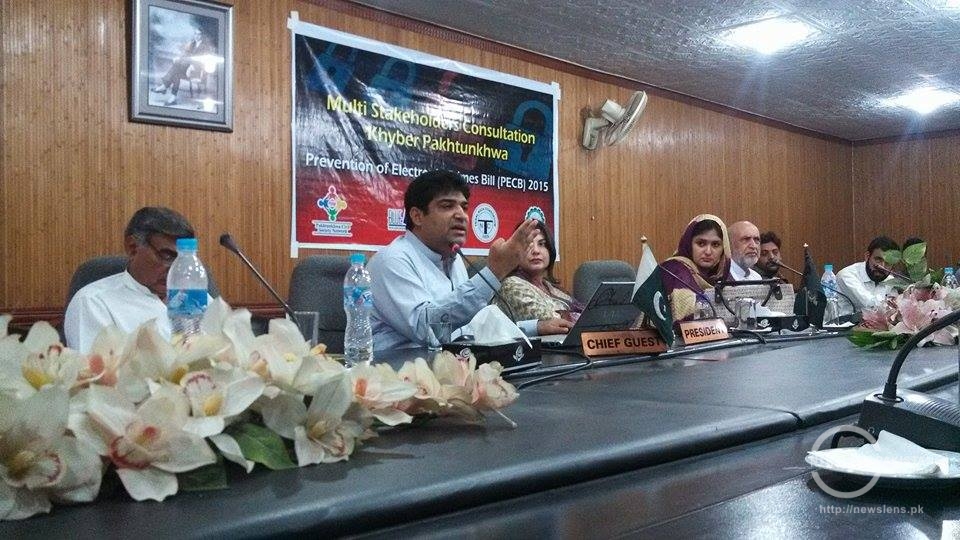
Peshawar: Electronic Crimes Bill of Pakistan, which is likely to be presented before the parliament for approval soon, is unacceptable for political and right activists who term it as an attack on the freedom of expression.
The bill has already been approved by the Senate’s Standing Committee for Information Technology. The bill would be viewed through different sectors of life and then would go through possible amendments and become Pakistan’s first law to pursue the Electronic Crimes across Pakistan.
President of Blue Veins Pakistan, a social organization working on digital rights, Qamar Nasim told a gathering held in Peshawar Chamber of Commerce Hall a few weeks ago that the Electronic Crimes Bill is open to consultation as the Information Technology Ministry’s website states that it would be soon reviewed by the civil society, media, rights, political and youth activists across Pakistan.
“We the citizens of this globe are divided into two classes in the world of technology; we are either online or offline. This is the first time Pakistan has planned such a bill after the National Action Plan was launched,” says Qamar.
Qamar while talking to News Lens Pakistan said that the “vague language” of the Bill can be a hurdle in the future as the articles in the said bill are controversial and can be used against political, social, right activists and journalists in that case it is an open attack on freedom of media and freedom of expression.
An Internet expert at the University of Peshawar, on request of anonymity, told News Lens Pakistan, “We are unable to close down the militant accounts of the Tehreek e Taliban Pakistan as Jamat ul Ahrar’s spokesman Ehsanullah Ehsan actively tweets on daily basis through his account.” When the owner of the said websites is not letting down these pages on simple request then the only way to block the domain is via Pakistan Telecommunication Authority.
Sanna Ijaz, 28, a blogger, rights and youth activist from Peshawar while talking to News Lens Pakistan said, “When there was no social media and independent newspapers in Pakistan, the socialist poets like Habib Jalib and Faiz Ahmed Faiz used their poetry to motivate and aware masses. They were detained and imprisoned by the then dictating rulers.”
Adding to this Sanna said that now social media, twitter, face book and sound bytes, videos play the same role for the deprived masses, the same is going to happen to them and these bloggers and writers would be detained for their opinion expressed through these social forums.
“The government in center is always led by Punjab, a province that’s the cause of deprivation of other nationalities living across Pakistan, and any piece written by Pakhtun, Baloch, Sindhis condemning the attitude of center would be taken as hate speech or offense against the state,” she further said.
Sanna views the Electronic Crimes Bill as “dangerous for the health of democratic values” because “data retention”, one of the articles of the bill, can change nationalists speeches and writings, blogs against Kalabagh Dam buildings and China Pakistan Economic Corridor would be taken as anti-state speeches.
She pinpointed that fact that the glorification of Mullah Omer, the Afghan Taliban leader, by a writer in Jang newspaper is never seen by those who boast about their crackdown against hate speech and terrorists hide outs. The bad would happen not to terrorism supporters and extremism perpetrators but only those leaders and activists who are working for peace and human rights will be the target of such laws and National Action Plans.
During a telephonic conversation, Salma Baloch, 28, told News Lens Pakistan that laws are need of time. The government of Pakistan and its parliamentarians are pushed to have military courts in constitution with a reform, so it can happen to the law regarding Internet as well.
“Terrorist militant organizations are busy spreading their anti-state propaganda so openly, so why should that be dealt with a law that we are lacking? Nothing bad would happen after having Electronic Crimes Bill, the bad will only happen for the fake websites and social media accounts as well as to those outlawed organizations who are actively disturbing peace,” she added.
Fawad Khan Pirzada, 25, a university student and political activist is concerned that the said Bill, if changed into law, would prevent him and other fellows from accessing the Internet openly. “Even at the moment all of the Baloch nationalists, political, social and rights activists’ websites, blogs and social media accounts are blocked in Pakistan. You bet this law would be a tap around our eyes,” Pirzada said.
According to Muhammad Asif, an activist and official of the Aurat Foundation, the Electronic Crimes Bill is both “good and bad” at the same time. While talking to News Lens Pakistan he said, “Without such law we cannot control what goes on the Internet as now recruitments and donations are even collected through the websites of extremists’ organizations.”
“The law is not something good in Pakistan. The closure of a complete domain of YouTube in Pakistan owing to a single video is still underway. Several pages such as Roshni, Bhensa, and Justice for Pashtuns are attacked on daily basis and after this bill coming into law, different Firewalls would be used to block the masses access to global world through Internet,” Shafiq Gigyani, a social activist of the Poha Foundation told News Lens Pakistan.



